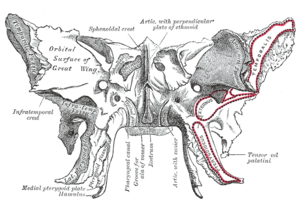Pterygoid processes
| Pterygoid processes of the sphenoid | |
|---|---|

Sphenoid bone, upper surface.
|
|

Sphenoid bone, anterior and inferior surfaces.
|
|
| Details | |
| Identifiers | |
| Latin | processus pterygoideus ossis sphenoidalis |
| Dorlands /Elsevier |
p_34/12667598 |
| TA | A02.1.05.042 |
| FMA | 54682 |
|
Anatomical terms of bone
[]
|
|
The pterygoid processes of the sphenoid, one on either side, descend perpendicularly from the regions where the body and the greater wings of the sphenoid bone unite.
Each process consists of a medial pterygoid plate and a lateral pterygoid plate, the latter of which serve as the origins of the medial and lateral pterygoid muscles. The medial pterygoid, along with the masseter allows the jaw to move in a vertical direction as it contracts and relaxes. The lateral pterygoid allows the jaw to move in a horizontal direction during mastication. Fracture of either plate are used in clinical medicine to distinguish the Le Fort fracture classification for high impact injuries to the sphenoid and maxillary bones.
The superior portion of the pterygoid processes are fused anteriorly; a vertical groove, the pterygopalatine fossa, descends on the front of the line of fusion. The plates are separated below by an angular cleft, the pterygoid notch, the margins of which are rough for articulation with the pyramidal process of the palatine bone.
The two plates diverge behind and enclose between them a V-shaped fossa, the pterygoid fossa, which contains the medial pterygoid muscle and the tensor veli palatini.
Above this fossa is a small, oval, shallow depression, the scaphoid fossa, which gives origin to the tensor veli palatini.
The anterior surface of the pterygoid process is broad and triangular near its root, where it forms the posterior wall of the pterygopalatine fossa and presents the anterior orifice of the pterygoid canal.
...
Wikipedia
